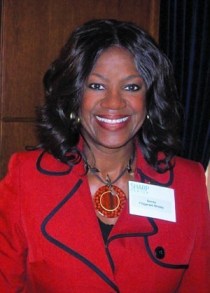 After 40 years of existence, Title IX still raises the hair on the necks of those critics who strongly feel the federal law hurts men’s sports. These naysayers continue to propagandize this lie.
After 40 years of existence, Title IX still raises the hair on the necks of those critics who strongly feel the federal law hurts men’s sports. These naysayers continue to propagandize this lie.
However, more often than not it seems that White females have been the main beneficiaries of the equity legislation since its passage 40 years ago. “I think it has been a law that helped all women,” says University of Wisconsin-Madison law student Valyncia Raphael. “But I think right now the conversation does not acknowledge that there are different types of women who have benefited from the law in different ways.”

Raphael made her observation during a national Title IX conference held last spring at the University of Michigan. She also commented on the small number of Black women speakers in attendance: “I think that it is irresponsible for a conference like that having a wealth of researchers and experts to not include those [Black] voices who are equally well versed on the topic.”
“Race and gender is a topic that needs to be addressed,” added DePaul University Assistant Director of Athletic Development Jennifer Lynne Thomas. “You have to recognize that race plays a big role, especially in minority participation and the access.”
Keita Armstrong, a University of Michigan sport management professor, was among the five presenters of color at the aforementioned event — her topic was “Racializing Gender: Title IX, Black Women and Sport (Disparities, Distortions and Dreams Deferred).” She pointed out that the law has been “a dream deferred” for Black females.

“I really wanted to accentuate…that when you talk about Title IX — it’s an outstanding law and has done a lot, even for women of color, but we have to understand the racializing of gender. I can’t enter with my gender and check my race at the door. You have to bring race into the conversation when you talk about gender,” noted Armstrong, the Michigan Center for Sport Management co-director.
“There is a cultural barrier that a lot of African American women don’t participate in physical activity,” says Candice Turner, an academic coordinator at Wayne State (Mich.) University. She believes that women in sport experts too often dismissed a probable reason why young Black girls aren’t participating in sport in higher numbers: hair issues.
“I think that has to be explored, because it is a legitimate point in our culture. I understand that it is a factor why they don’t know how to swim or they don’t do strenuous activities that would cause them to let their hair out,” Turner points out.
“Thousands of men and women who participated in the Civil Rights Movement and the women’s movement back in the 60s and the 70s, the Civil Rights Act and the Voting Rights Act and Title IX collectively and individually made it possible for women and Blacks to get unprecedented opportunities,” said Benita Fitzgerald Mosley, USA Track & Field chief of sports performance and Women’s Sports Foundation board chair.
We asked several other Black females to share their Title IX recollections.
“Both personally and professionally I have seen an impact. My nieces have grown up in a post-Title IX world,” surmises WNBA President Laurel Richie. “They both participated in sports at the high school and collegiate level and didn’t think twice about it. And the women in last year’s and this year’s draft coming into the league spoke to their professional sports role models as men and women.
“I think pre-Title IX that would have been harder for them to do, because there weren’t as many opportunities for women. I think Title IX has fueled the pipeline for the WNBA”

“It helped me in all parts of my life,” says local broadcaster Lea B. Olsen. “When I went to play high school basketball at Minneapolis South, I didn’t even question the thought that I wouldn’t play basketball, and that was because of Title IX. Then to have the opportunity to play in college [at both Minneapolis Community and Technical College and the University of Minnesota], both made me a better person, a better basketball player, and opened the doors to my career in broadcasting.”
Olsen adds that her daughter now is aware of Title IX “because she’s written a report on it for school. Before that she certainly didn’t understand that girls did not have the same opportunities [as boys].
“I have to give Title IX a huge amount of credit for shaping my life to where it is now,” Olsen concludes.
Did you know…?
Before she became a top sports executive, Benita Fitzgerald Mosley made history in the mid-1980s. Name the historic feat. (Answer in next week’s “View.”)
Answer to last week’s question: How many Black players ever wore a Minnesota Twins uniform? It is estimated that fewer than 50 Blacks have played for the team since it relocated from Washington, D.C. in 1961.
Charles Hallman welcomes reader responses to challman@spokesman-recorder.com.
Support Black local news
Help amplify Black voices by donating to the MSR. Your contribution enables critical coverage of issues affecting the community and empowers authentic storytelling.









